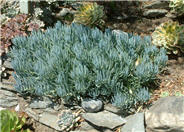
Common name:Kleinia
Botanical name:Senecio mandraliscae
This succulent perennial will grow to about 1.5' tall and 2' wide. It has curved, bluish gray leaves that are about 3.5" long and very slender.
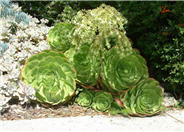
Common name:Parasol Aeonium
Botanical name:Aeonium arboreum
Parasol Aeonium is an upright succulent with rosette leaf clusters. It forms a mound and can be easily propagated by cuttings.
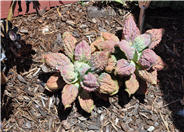
Common name:Echeveria hybrids
Botanical name:Echeveria hybrids
Echeveria hybrids are succulents that comes in numerous varieties and forms. It makes a wonderful accenting plant for beds needing contrast. Cultivars come in various sizes and colors too various to list.
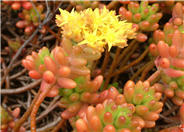
Common name:Pork And Beans
Botanical name:Sedum X rubrotinctum
This ground cover will grow less than 1' tall and has small leaves that vary in color and are brownish bronze in the fall. Red and yellow flowers will bloom in spring and summer.
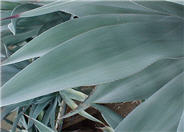
Common name:Smooth-edged Agave
Botanical name:Agave weberi
This is a striking medium-sized Agave that can grow to 5' tall by 6'-10' wide. This agave has very fine marginal teeth and is sometimes spineless. Supplemental summer watering can prevent yellowing from heat stress in the summer. These plants are also moderately cold hardy and tolerant of temperatures down to 12 degrees F. It is more refined looking than americana. It is native in central Eastern Mexico. It is one of the largest of the Agaves.
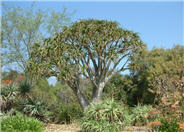
Common name:Baines Tree Aloe
Botanical name:Aloe barberae
This slow-growing tree has a heavy trunk with forking branches. It produces 2'-3' leaves in rosettes and rose/pink flowers.
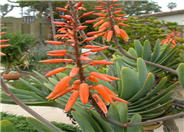
Common name:Fan Aloe
Botanical name:Aloe plicatilis
This wide succulent shrub grows 3'-6' tall and wide, with fan-like clusters of the bluish-gray round tipped leaves. From each fan emerges an open terminal cluster of tubular, orange red flowers in late winter to early spring. Plant in full sun if on the coast or in shade if inland. It is hardy to about 23 degrees F. It needs winter and spring irrigation if grown where does does not receive adequate water from rainfall.
Dealing With Drought
More than half of the water used at your home is for outside purposes. Studies show that on average, half of the water used outdoors is wasted. The leading cause of waste is incorrectly set and poorly managed irrigation controllers. The second biggest cause of wastage is broken irrigation equipment that goes undetected. There are a few basic things you can do to make a big difference in your water use.
Click in the green box for more information
| Designer: Anon | Packed Succulent Garden |
Photographer: GardenSoft |
Soils and Compost:
Incorporate compost 6" into your soil to retain water, reduce compaction, feed earthworms, and provide valuable nutrients to your plants.
Water Saving Tip:
Adjust sprinklers to avoid watering sidewalks and driveways.
Integrated Pest Management:
Drip and other smart irrigation delivers water directly to roots, allowing no excess water for weeds.

